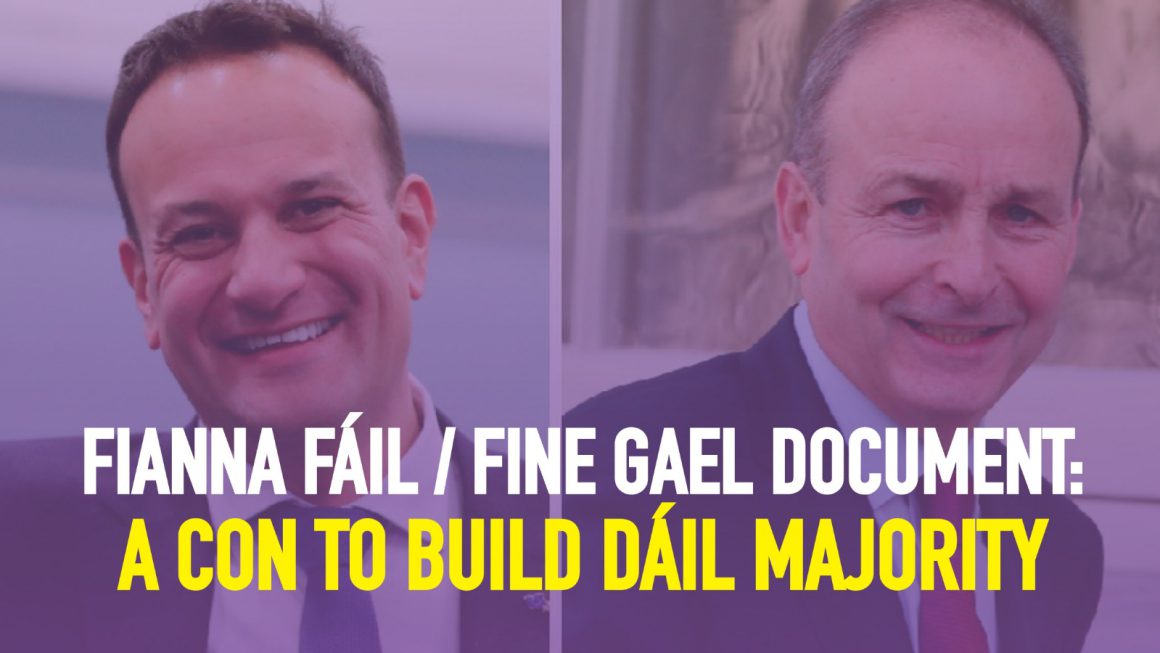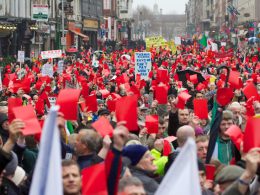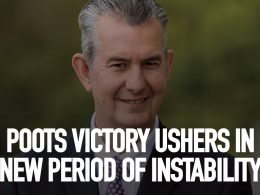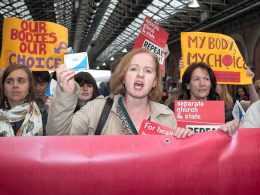By Michael O’Brien
A paper with the long-winded title “A draft document between Fianna Fáil and Fine Gael to facilitate negotiations with other parties on a plan to recover, rebuild and renew Ireland after the COVID-19 Emergency” has been circulated by those two parties to Labour, Social Democrats and the Green Party in an effort to assemble a majority government.
Spin and buzz words
The old buzz words are still there about “having a vibrant private sector and pro-enterprise policies, and being open and attractive to foreign direct investment”. However there contains some nods to the election results in February and the abundant evidence of failures of the capitalist market in the course of the Covid-19 pandemic, but also in the years prior. For example it has taken the pandemic for Fianna Fáil and Fine Gael to draw the conclusion that: “The importance of the well resourced, properly functioning and responsive State has never been clearer.”
They go on to commit to “placing the State firmly at the centre of the Irish housing market”, although also wanting to “prioritise home ownership”. They state the aspiration for achieving a minimum “living wage” in the course of the five-year Dáil term, which would mean a rise averaging 44 cents per year not factoring inflation. There are further aims stated of delivering on Sláintecare and “affordable” childcare. In other words, right some of the biggest wrongs over which they have both presided over decades!
Bereft of targets
The document is largely bereft of actual targets and is therefore aspirational. They claim that these things can be achieved without altering PAYE and USC rates, or touching “core” social welfare rates. The use of the word “core” is significant in that the Labour Party used to falsely claim, when in government from 2011 to 2016, that they protected “core” social welfare payments.
In terms of how these reforms would be paid for the document is silent. Taking the document at face value they can attempt to deliver on the stated aspirations either by borrowing money or by raising taxes from other sources i.e. wealth, profits, and financial transactions. However the only revenue raising measure they propose is a carbon tax, which will especially appeal to the Green Party and disproportionately affect working-class and poor people.
Additional pressure may come from the EU Commission in the coming period for Ireland to harmonise its corporation tax rate with the rest of the eurozone. Listening carefully to mainstream political correspondent commentary and interviews with Ministers it is clear that their intention is to borrow their way out of the crisis, taking advantage of the low interest rates that prevail now. However, this may not last into the future if Ireland’s rating changes for the worse in the eyes of the profiteers in the financial markets.
The references to the EU are glowing and they claim that they can achieve their promises within the terms of the fiscal rules, which is patently not the case. These rules, written in the interests of super-rich bankers, set strict limits on debt and deficits which have been set aside for now, but remain on the statute books, and can be reasserted with a vengeance in the near future.
Attacking public sector workers
The document refers to the “debt of gratitude” owed to healthcare workers, but is silent on the question of public service pay. The cuts and impositions to public service pay and conditions of the last austerity years have still not yet been reversed in total, most egregiously of all; two-tier pay. Pro-capitalist broadcaster and journalist Matt Cooper writing in the Sunday Business Post last Sunday made the case that the government will have to cut public service pay. Moves in this direction have the potential to be explosive. However, significant pressure will have to come from the ranks of the public service unions to force a struggle on pay, as the calibre of leadership in the trade union movement has not altered since the last austerity years.
There are other stand-out failings in the document which is being wrongly described in the media by both government supporters and detractors as progressive. On climate change they commit to a carbon neutral economy by 2050, i.e. twenty years too late! There is silence on matters such as banning further fossil fuel exploration. Zero mention of the scandal of Direct Provision, Traveller rights and the continued use of Shannon Airport by the US military.
Exercise in deceit
So this is the document that is designed to lure either the Green Party, Labour or Social Democrats into government. That the document is an exercise in deceit is exposed in the Irish Times front page (23 April) with a report on a leaked internal government memo which gives a truer sense of their short term perspective which “warned the next phase of the coronavirus crisis has the potential to be ‘far more divisive’ as the full implications of the pandemic sink in with the public.” This language is far removed from the benign language FF/FG are using in their engagement with the other parties such as Social Democrats and the Greens. None of whom are adverse in principle to entering government, if they think they can sell it to their own membership and voter bases in the short term.
Neither Fianna Fáil or Fine Gael are confident about imposing a neo-liberal, austerity regime on working-class people. This is particularly the case given the drubbing they received in the general election and the fact that the policies of neo-liberalism, such as the existence of a two-tier health service, have shown to be thoroughly wanting when dealing with the COVID-19 crisis. The memory of the water charges defeat also looms large. However, they, and their respective coalition partners, will seek ultimately to make working-class people pay for the crisis facing their capitalist system.
Not only will workers need to be organised in a fighting trade union movement to combat this, it will be necessary to organise in a new party of the working class. Such a party will need to break with the brutal logic of capitalism and fight for a socialist alternative where society’s wealth is publicly owned and democratically controlled and planned in the interests of all.












